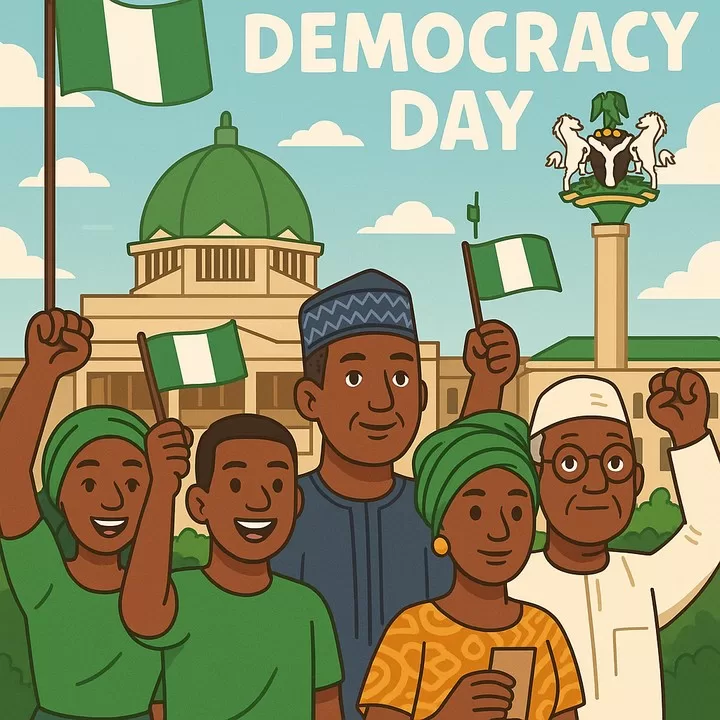
JUNE 12, THE NIGERIAN DEMOCRATIC REALTY: A LEGACY IN QUESTION
On June 12, 1993, millions of Nigerians trooped to the polls to vote in what is widely acknowledged as the freest and fairest election in the country’s history.
The presumed winner, Chief Moshood Kashimawo Olawale (MKO) Abiola, became a symbol of democratic aspiration after the election was controversially annulled by the military regime of General Ibrahim Babangida.
Since 2018, when President Muhammadu Buhari officially recognized June 12 as Democracy Day, this date has carried both historical reverence and contemporary resonance. However, in 2025, the promise and principles of June 12 remain contested and, to many, unfulfilled.
A Legacy of Promise and Pain
The annulment of the 1993 elections ignited a wave of civil resistance, advocacy for civil liberties, and ultimately the transition to civilian rule in 1999. MKO Abiola’s incarceration and subsequent death underscored the high cost of democratic struggle.
While June 12 symbolizes hope, resilience, and popular sovereignty, current realities suggest a widening gulf between the ideals it represents and the political landscape that has since evolved.
The Political Climate in 2025
Under President Bola Ahmed Tinubu, a prominent figure in the June 12 struggle, Nigerians had hoped for a reinvigoration of democratic values. However, the prevailing political climate is marked by several troubling trends:
- Democratic Erosion: Allegations of electoral manipulation in the 2023 elections, suppression of opposition voices, and partisan control over key democratic institutions have raised fears of democratic backsliding.
- Judicial Complicity: Questions continue to swirl around the independence of the judiciary. Several controversial court rulings have further eroded public trust in the system meant to uphold justice.
- Economic Disillusionment: Despite lofty campaign promises, economic hardship has intensified. Inflation, currency depreciation, and rising unemployment have fueled public frustration, with many questioning the essence of democracy if it fails to improve living standards.
- Security Concerns: From insurgency in the northeast to rising banditry in the northwest and separatist tensions in the southeast, national security remains precarious. The inability of successive governments to provide safety undermines citizens’ faith in democratic governance.
Civil Society and Public Sentiment
The vibrancy of civil society, once a hallmark of Nigeria’s push for democracy, is now under strain. Activists face increased surveillance, arbitrary arrests, and a shrinking civic space. Despite this, voices from organizations like SERAP, Enough is Enough (EiE), and the United Nigeria Youth Forum (UNYF) continue to demand accountability, youth inclusion, and systemic reform.
Public sentiment, especially among the youth, reflects deep skepticism. The generation born after 1999 is increasingly disillusioned with “democracy” as practiced in Nigeria. Protests like #EndSARS in 2020 and continued online activism reflect a hunger for genuine representation and governance.
Symbolism vs. Substance
The 2025 Democracy Day saw President Tinubu cancel the traditional military parade in favor of a National Assembly address. While symbolically significant, critics argue such gestures are insufficient. The rituals of democracy—elections, ceremonies, and broadcasts—have not translated into democratic dividends for the average Nigerian.
The Path Forward
To reclaim the true spirit of June 12, Nigeria must go beyond symbolic commemoration:
Electoral Reforms: Strengthening INEC’s independence, deploying robust technology, and ensuring transparency are critical.
Judicial Accountability: An autonomous judiciary that commands public confidence is essential for rule of law.
Inclusive Governance: Bridging ethnic, regional, and generational divides requires intentional political inclusion.
Socioeconomic Development: Democracy must deliver in terms of jobs, healthcare, education, and infrastructure.
Conclusion
June 12 stands as a powerful reminder of Nigeria’s potential for democratic greatness. Yet in 2025, that potential is in peril.
The current generation of leaders bears a moral and historical responsibility to honor the legacy of MKO Abiola not with platitudes, but with purposeful action. Only then can Nigeria move from symbolic democracy to one rooted in justice, equity, and true popular will.
 Premium News
Premium News